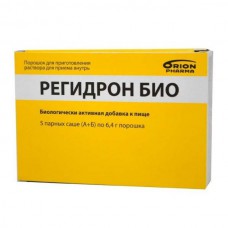Expiration date: 04/2026
Indications for use of the drug Rehydron
- restoration of water and electrolyte balance, correction of acidosis in acute diarrhea (including cholera), when thermal lesions associated with disorders of water and electrolyte metabolism, with the goal of preventing thermal and physical loads that cause excessive perspiration,
- oral rehydration therapy in acute diarrhea with mild (weight loss of 3-5%) or medium (weight loss of 6-10%) degree of dehydration.
Pharmacological action:
Drug for correction of the energy and electrolyte balance.
Restores water and electrolyte balance, impaired when dehydration correct acidosis.
The osmolality of the solution Rehydron is 260 mOsm/l, pH 8.2.
In comparison with standard oral rehydration solution recommended by who, smallintestine slightly lower (the efficiency of the rehydration solution with reduced osmolality of well proven), the sodium concentration is also lower (to prevent the development of hypernatremia), and the potassium content is higher (for faster recovery in the level of potassium).
Pharmacokinetics
Data on the pharmacokinetics of the drug Rehydron do not exist.
Dosing regimen:
One sachet dissolved in 1 l of water, the prepared solution is taken orally. If you are not sure that the water is safe to drink, it is necessary to boil and cool before preparing the solution. The prepared solution should be stored in a cool place at 2° to 8°C and use within 24 h In a solution you cannot add any other components to not interfere with the action of the drug.
Before starting treatment, the patient should be weighed to assess weight loss and degree of dehydration.
The power of the patient or breastfeeding should not be interrupted during oral rehydration therapy or should continue immediately after the rehydration. It is recommended to avoid foods high in fats and simple carbohydrates.
To prevent dehydration admission Rehydron should be started as soon as diarrhea started. Usually the drug is used not more than 3-4 days, the treatment is terminated with the end of diarrhoea.
Nausea or vomiting solution it is desirable to provide chilled small, repeated doses. You can also use a nasogastric tube under the supervision of a physician.
For rehydration therapy Rehydron take during the first 6-10 h in an amount that is twice the loss of body weight caused by diarrhea. For example, if the loss of body weight is 400 g, the number Rehydron is 800 g or 8.0 DL. During this phase of treatment the use of other liquids is required.
Side effects
Provided that the recommended doses Rehydron side-effects are unlikely. Potential allergic reactions.
Contraindications to the use of the drug Rehydron
- — renal dysfunction,
- — insulin-dependent diabetes mellitus,
- — non-insulin dependent diabetes mellitus,
- — unconsciousness
- — intestinal obstruction,
- — hypersensitivity to the drug.
The use of the drug Rehydron of pregnancy and breast-feeding
In recommended doses Rehydron can be administered during pregnancy and lactation.
Application for violations of renal function
The drug is contraindicated in violation of kidney function.
Special instructions:
Severe dehydration (loss of body weight >, 10%, and anuria) should be adjusted with the use of funds for rehydration for/in the introduction, you can then assign Rehydron.
Do not exceed recommended dose, if the need for additional administration of electrolytes has not been confirmed by laboratory tests.
A bag of the drug Rehydron dissolved in 1 liter of water. If the recommended volume is given a highly concentrated solution, the patient may develop hypernatremia.
The solution is not to add sugar. Food can be given immediately after rehydration. Vomiting should wait 10 minutes and drink the solution slowly, in small SIPS. Patients whose dehydration was developed on the background of renal failure, diabetes or other chronic diseases, which violated the acid-base, electrolyte or carbohydrate balance, requires careful monitoring during therapy with the drug Rehydron.
In applying the drug Rehydron required to consult a doctor in the following cases: slow speech, fast fatigue, drowsiness, the patient does not answer questions, increase in body temperature over 39°C, the cessation of urine output, the appearance of liquid bloody stool, diarrhea lasting more than 5 days, sudden cessation of diarrhoea and severe pain, if the treatment at home is ineffective and impossible.
Effects on ability to drive vehicles and management mechanisms
Rehydron does not affect the ability to drive vehicles and management mechanisms.
Overdose:
Symptoms: with the introduction of the solution Rehydron in a large volume or excessive concentration of possible hypernatremia (weakness, neuromuscular excitation, drowsiness, confusion, coma, sometimes even stop breathing) in patients with impaired renal function may develop metabolic alkalosis, which is manifested in the decrease of lung ventilation, neuromuscular excitation, and tetanic convulsions.
Treatment: in the event of a significant overdose is required physician supervision. Correction of electrolyte balance and fluids should be carried out on the basis of laboratory data.
Drug interactions
Drug interactions drug Rehydron not been studied.
The drug solution has a slightly alkaline reaction, therefore, can affect the effectiveness of drugs, absorption depends on pH of the intestinal contents.
The diarrhea itself may change the absorption of many drugs, which are absorbed in the small or large intestine, or drugs, in the metabolism where the intrahepatic circulation.
Terms and conditions of storage:
The drug should be stored at room temperature (15° to 25°C) out of reach of children.


